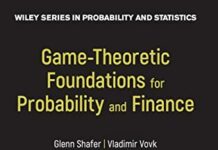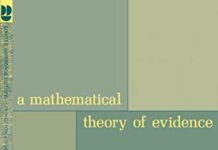
Ebook Info
- Published: 2001
- Number of pages: 440 pages
- Format: PDF
- File Size: 19.62 MB
- Authors: Glenn Shafer
Description
Provides a foundation for probability based on game theory rather than measure theory. A strong philosophical approach with practical applications.Presents in-depth coverage of classical probability theory as well as new theory.
User’s Reviews
Editorial Reviews: Review “Shafer…and Vovk…explain how probability can be based on game theory rather than measure theory, and how doing so allows it to be used in finance with out a lot of distracting an confusing assumptions about randomness.” (Reference & Research Book News, November 2001) “….an interesting new mathematical and philosophical framework for probability…” (Zentralblatt Math, Vol.985, No.10, 2002)”…a creative, entertaining and imaginative book…” (Short Book Reviews, August 2002)”The first half of this truly original book introduces a novel approach to probability, founded on game theory rather than measure theory. In an admirably clear, scholarly and engaging manner, it traces its historical antecedents, expounds its advantages, develops its technicalities, and addresses its philosophical implications. The second half goes on to do the same for financial modelling. This is a book that should utterly change the way we think about its two topics.”Philip Dawid (University College London, UK) From the Inside Flap A new game-theoretic approach to probability and finance Probability and Finance presents essential reading for anyone who studies or uses probability. Mathematicians and statisticians will find in it a new framework for probability: game theory instead of measure theory. Philosophers will find a surpising synthesis of the objective and the subjective. Practitioners, especially in financial engineering, will learn new ways to understand and sometimes eliminate stochastic models. The first half of the book explains a new mathematical and philosophical framework for probability, based on a sequential game between an idealized scientist and the world. Two very accessible introductory chapters, one presenting an overview of the new framework and one reviewing its historical context, are followed by a careful mathematical treatment of probability’s classical limit theorems. The second half of the book, on finance, illustrates the potential of the new framework. It proposes greater use of the market and less use of stochastic models in the pricing of financial derivatives, and it shows how purely game-theoretic probability can replace stochastic models in the efficient-market hypothesis. From the Back Cover A new game-theoretic approach to probability and finance Probability and Finance presents essential reading for anyone who studies or uses probability. Mathematicians and statisticians will find in it a new framework for probability: game theory instead of measure theory. Philosophers will find a surpising synthesis of the objective and the subjective. Practitioners, especially in financial engineering, will learn new ways to understand and sometimes eliminate stochastic models. The first half of the book explains a new mathematical and philosophical framework for probability, based on a sequential game between an idealized scientist and the world. Two very accessible introductory chapters, one presenting an overview of the new framework and one reviewing its historical context, are followed by a careful mathematical treatment of probability’s classical limit theorems. The second half of the book, on finance, illustrates the potential of the new framework. It proposes greater use of the market and less use of stochastic models in the pricing of financial derivatives, and it shows how purely game-theoretic probability can replace stochastic models in the efficient-market hypothesis. About the Author GLENN SHAFER, PhD, is Professor in the Graduate School of Management at Rutgers University. He is also the author of The Art of Causal Conjecture, Probabilistic Expert Systems, and A Mathematical Theory of Evidence. VLADIMIR VOVK, PhD, is Professor in the Department of Computer Science at Royal Holloway, University of London. Read more
Reviews from Amazon users which were colected at the time this book was published on the website:
⭐Glenn Shafer wrote a very thought provoking book on the mathematical theory of evidence many years ago. Vladimir Vovk was a student of Kolmogorov. At first I thought this would be a book that tries to replace the measure theoretic approach to probability with a game theory (gambling) approach and I was skeptical about it being successful. But these authors are serious and first rate probabilists who understand the theory, foundations and history of probability from all the angles.The authors sell the book as two books. The first half presents probability theory and the classic probability results in the framework of a game between two opponents that they call Skeptic and the World. If we replaced Skeptic by Investor and World by Market we see it naturally as an investment problem in finance. They see their methodology as natural for a course in the probabilist approach to financial problems. The special topics in finance and important models such as Black-Scholes is then the subject of the second part of the book.On the other hand if you replace Skeptic with Gambler and World with the House we see this as the natural gambling problem that really goes back to the origin of probability and the days of Fermat and Pascal. It is this third aspect of the book that I enjoy the most. In this first part, their approach is mixed in with the history of probability. The famous probabilists and their theories come to life in photographs and sketches. We get the introduction of Martingales as developed by Jean Ville in his 1939 book. The subjective approach of de Finetti, von Mises approach through collectives, Kolmogorov’s establishment of mathematical rigor through the measure theoretic approach, Kolmogorov’s later development of complexity theory and the various debates on probability by the great 20th century probabilists including J. L. Doob. We are even introduced to lesser knowns such as the UCLA mathematician Tony Martin (picture in the appendix with his theorem)who in 1990 provided an important advanced mathematical result in game theory that is important in these authors’ approach. Curiously, we also see a picture of D. R. Cox a famous statistician (but not known for fundamental contributions to probability).This book is long on historical perspective, philosophy and clear writing. But don’t think that it is a probability for dummies book. The probability theory is deep and the mathematics is not necessarily simple. I think the authors find their approach more appealing than the usual measure theoretic approach that requires the formality of the holy triple (sample space, sigma algebra and probability measure).This book is good for learning the history of probability from the Bernoulli’s and DeMoivre and Laplace through to the 21st century. It is also good for learning the fundamentals of stochastic finance. A great book for probablists and statisticians to have.Bayes is the only major historical character I can think of who is missing from the book and it is a mystery to me that they would leave him out especially since they do spend time covering deFinetti and subjective probability. They also say that their approach borrows from both the subjective and the frequentist schools. Bayesian methods are mentioned only briefly on page 59 where the “neosubjectivist” movement is discussed and we see a picture of Bruno de Finetti (the first one that I have seen).If you want to see a different approach to finance that relies heavily on the Ito Calculus, Mike Steele’s book published by Princeton University Press offers it to you. That book is one of the few references on the subject that is not in the authors’ bibliography. The bibliography is nice and fairly extensive.This book could be used for a graduate level course in probability from a non-traditional framework. It is good also for business school students with a serious interest in probability and the second half of the book could be used for a course in stochastic finance.
⭐
⭐
⭐
⭐
⭐
Keywords
Free Download Probability and Finance: It’s Only a Game! 1st Edition in PDF format
Probability and Finance: It’s Only a Game! 1st Edition PDF Free Download
Download Probability and Finance: It’s Only a Game! 1st Edition 2001 PDF Free
Probability and Finance: It’s Only a Game! 1st Edition 2001 PDF Free Download
Download Probability and Finance: It’s Only a Game! 1st Edition PDF
Free Download Ebook Probability and Finance: It’s Only a Game! 1st Edition


